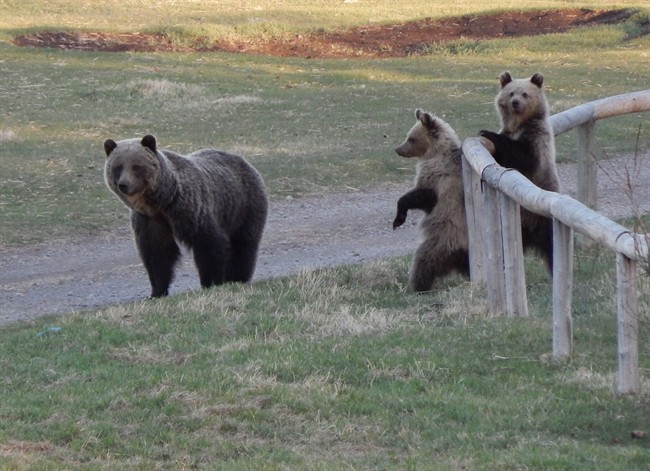When it comes to bad behaviour in grizzly bears, new research blames the moms.

A University of Alberta study suggests that cubs who have watched their mothers come into conflict with people are more likely to do so as well.
Wildlife ecologist Andrea Morehouse says it’s evidence of social learning in grizzlies.
“Bear biologists have long suspected that cubs learn behaviours,” she said Wednesday.
“If we can stop female grizzlies from becoming problem bears in the first place, we can prevent the social learning of problem behaviour in cubs and help stop the cycle at its source.”
READ MORE: Ontario band captures video of grizzly bear eating moose on side of Alberta highway
The research is published in the online science journal PLOS ONE.
The findings are based on a study of 2,043 grizzlies in Alberta, British Columbia and Montana that was done with the United States Geological Survey.
Morehouse and her colleagues created family trees of grizzly bears using DNA samples taken over the years from captured bears or from fur collected from trees and fences bruins rubbed against.
Researchers focused on specific grizzlies that had been involved in attacks on people, livestock or pets, as well as on bears that had broken into grain bins or fed on garbage.
- Southeast Calgary residents frustrated after strip mall parking lot potholes damage vehicles
- City buys back land after former Ernest Manning High School site sits empty
- ‘It is the love’: Wally the injured stray dog gets new ‘leash’ on life
- Alberta government closing in on new deal to pay family doctors
They found a link between mother bears and cubs when it came to problem behaviour. The link wasn’t there with father bears.
“With grizzly bears, cubs stay with their moms for about two to three years,” Morehouse said. “It is just the moms that are involved in the rearing of the offspring. Male grizzly bears are not involved in that.”
WATCH: Grizzly bear dives for salmon in viral video
Morehouse said the findings suggest behaviour is not passed down genetically. They also point to the need for people to help prevent problem behaviour in mother grizzlies.
Measures researchers recommend include increased use of electric fencing, tougher handles on grain bins to make them more difficult for bears to open, quick removal of dead livestock and securing garbage in bear-proof containers.
Parks Canada says about 20,000 grizzly bears remain in British Columbia, Alberta, Yukon and the Northwest Territories.
READ MORE: Alberta bear experts warn of conflicts with cyclists as woman recovers from attack
Researchers estimate there are about 700 of the bears in Alberta, where the species is listed as threatened.
Morehouse said it is possible to condition problem bears to avoid people by scaring them using small explosives called bear bangers, shooting them with rubber bullets or confronting them with specially trained dogs.
READ MORE: West-central Alberta grizzly bear population doubled in last 10 years: study
But preventing bad bear behaviour in the first place is more effective, she said.
“The main message is we can try and prevent the behaviours that we don’t want to see develop.”

Comments